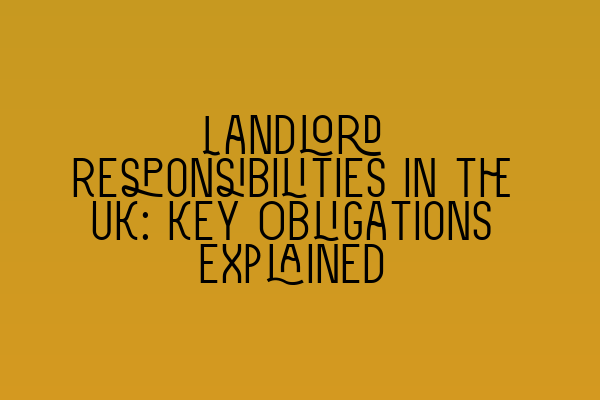Landlord Responsibilities in the UK: Key Obligations Explained
As a landlord in the UK, it is essential to be aware of your responsibilities and obligations to ensure a smooth and lawful tenancy. By understanding and fulfilling these duties, you can establish a positive relationship with your tenants and avoid legal consequences. In this article, we will discuss the key landlord responsibilities in the UK, providing a comprehensive guide to help you navigate the complexities of property management.
1. Safety Regulations
The safety of your tenants should be the first and foremost concern as a landlord. There are several safety regulations that you must comply with, including:
- Gas Safety: You are obligated to ensure that gas appliances, fittings, and flues are maintained and inspected annually by a Gas Safe registered engineer. Obtaining a Gas Safety Certificate is crucial, and you must provide a copy to your tenants.
- Electrical Safety: It is essential to ensure that electrical installations and appliances provided by you are safe. Regular inspections and necessary maintenance should be carried out to meet the required standards.
- Fire Safety: As a landlord, you should equip the property with appropriate fire safety measures, including smoke alarms, carbon monoxide detectors, and fire extinguishers. Regular testing and maintenance of these devices are also necessary.
By adhering to these safety regulations, you not only protect your tenants but also demonstrate your commitment to their well-being.
2. Repairs and Maintenance
Another crucial responsibility as a landlord is to ensure that the property is maintained in a habitable condition. You are accountable for promptly addressing and rectifying any necessary repairs that affect the tenants’ quality of life. These repairs may include:
- Maintaining the structure, exterior, and common areas of the property
- Ensuring the plumbing, heating, and electrical systems are in proper working condition
- Fixing any issues with doors, windows, and locks
- Addressing problems with appliances and fixtures provided with the rental
Regular maintenance and pre-emptive repairs can help prevent more significant issues from arising, ensuring tenant satisfaction and protecting the value of your property.
3. Tenancy Agreements and Deposits
One of your responsibilities as a landlord is to provide a written tenancy agreement to your tenants. The agreement should outline the terms and conditions of the tenancy, including the amount of rent, duration of tenancy, and any other important clauses.
In addition to the tenancy agreement, you are also required to protect the tenant’s deposit in a government-approved tenancy deposit scheme within 30 days of receiving it. The deposit must be returned to the tenant at the end of the tenancy, provided there are no damages or unpaid rent.
4. Right to Rent Checks
Under UK law, landlords are responsible for conducting right to rent checks on prospective tenants. These checks are essential to ensure that the tenants have the legal right to rent a property in the UK. Failure to conduct these checks can lead to severe penalties, including fines and imprisonment.
It is essential to stay up-to-date with the latest immigration rules and guidelines to ensure compliance with the right to rent checks.
5. Energy Performance Certificates (EPC)
As a landlord, you must provide an Energy Performance Certificate (EPC) to your tenants. An EPC rates the energy efficiency of a property and provides recommendations for improvement. This certificate should be given to the tenant before they move in.
Additionally, the EPC rating must be stated in any advertisements for the rental property. Failing to comply with this requirement can result in financial penalties.
Conclusion
Being a landlord comes with significant responsibilities that should not be taken lightly. By familiarizing yourself with and fulfilling your obligations, you can ensure a safe and pleasant living environment for your tenants while minimizing the risk of legal complications.
If you need further guidance on navigating landlord responsibilities or require legal advice, do not hesitate to consult with the legal experts at SQE Property Law & Land Law. Our experienced solicitors can provide professional assistance tailored to your specific needs.
For more information about property law and the SQE exams, please check out our related articles:
